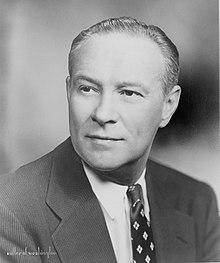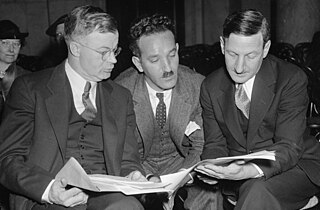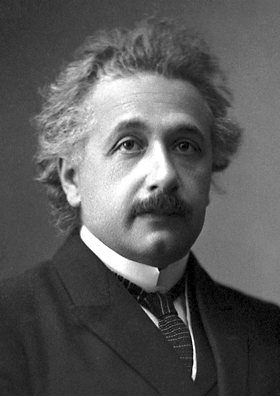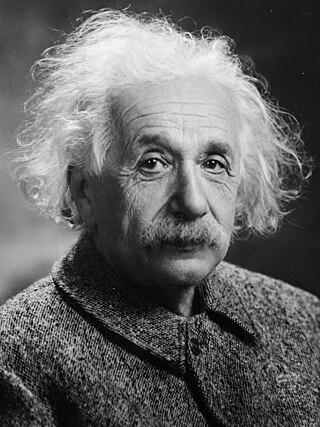
William Frauenglass was a high-school teacher to whom Albert Einstein wrote a letter on academic freedom, published in the New York Times and much publicized at the time. [1] [2] [3]

William Frauenglass was a high-school teacher to whom Albert Einstein wrote a letter on academic freedom, published in the New York Times and much publicized at the time. [1] [2] [3]

In 1928, Frauenglass obtained a BA in social science from the City College of New York. In 1952, he obtained a degree from New York University.

Frauenglass became an English teacher at the James Madison High School in Brooklyn, New York. He was a member of the Teachers' Union Local 5 of the American Federation of Teachers, of which he was proud. [1]

On April 24, 1953, attorney Joseph Forer (member of the Washington, DC, chapter of the National Lawyers Guild) represented Frauenglass when he appeared under subpoena before the United States Senate Subcommittee on Internal Security. The subcommittee's interest lay in Frauenglass's participation in a class led by one Louis Relin in April 1947. [1]
Frauenglass described for them:
Well, I was invited to speak, I was invited to give a lecture in the field of English literature. I have been active in the English Teachers Committee on Intercultural Education and also in my school, trying to carry into effect the program which the board of education was then interested in. the Springfield plan of introducing intercultural education into the school.
In my school when the first alertness course was given by the board of education in that field and the principal asked for somebody to volunteer to take part, I volunteered for the very first course, I think, given under the auspices of Mrs. Dubois at Textile High School, and I became intensely interested in the subject and volunteered and was commended by the chairman of my department for introducing cultural activity into that field [1]
Frauenglass pled the Fifth whenever asked about affiliations with the Communist Party USA. [1]

On May 16, 1953, scientist Albert Einstein wrote Frauenglass a letter, [4] which the New York Times published on June 12, 1953. (Einstein had added a postscript stating the letter "need not remain confidential"). In the letter, Einstein had advised (reported the Times) that "every intellectual called before a Congressional investigating committee should refuse to testify, and 'must be prepared for jail and economic ruin, in short, for the sacrifice of his personal welfare in the interest of the cultural welfare of his country'." [2]
(During those hearings, Bella Dodd, former member of the Teachers' Union, testified about its communist infiltration and named Dale Zysman as a prominent communist within the union. [5] [6] )
Frauenglass did refuse to testify further – and he did lose his job. [3]

The American Federation of Teachers (AFT) is the second largest teacher's labor union in America. The union was founded in Chicago. John Dewey and Margaret Haley were founders.
Jerome Dwight Davis, was an American activist for international peace and social reform, a labor organizer, and a sociologist who founded the organization Promoting Enduring Peace. Early in his life, he campaigned to reduce the workweek and as an advocate of organized labor.

J. Peters was the most commonly known pseudonym of a man who last went by the name "Alexander Stevens" in 1949. Peters was a journalist, political activist, and accused Soviet spy who was a leading figure of the Hungarian language section of the Communist Party USA in the 1920s and 1930s. From the early 1930s, Peters was actively involved in the espionage activities of the Soviet Union in the United States, fabricating passports, recruiting agents, and accumulating and passing along confidential and secret information.

Nathan Witt, born Nathan Wittowsky, was an American lawyer who is best known as being the Secretary of the National Labor Relations Board (NLRB) from 1937 to 1940. He resigned from the NLRB after his communist political beliefs were exposed, and he was accused of manipulating the Board's policies to favor his own political leanings. He was also investigated several times in the late 1940s and 1950s for being a spy for the Soviet Union in the 1930s. No evidence of espionage was ever found.
Bella Dodd was a teacher, lawyer, and labor union activist, member of the Communist Party of America (CPUSA) and New York City Teachers Union (TU) in the 1930s and 1940s, and vocal anti-communist after she had a big conversion after meeting Fulton J. Sheen, Bishop of Rochester, New York.
Watkins v. United States, 354 U.S. 178 (1957), is a decision of the Supreme Court of the United States that held that the power of the United States Congress is not unlimited in conducting investigations and that nothing in the United States Constitution gives it the authority to expose the private affairs of individuals.
Silas H. Rhodes was an American educator and co-founder of a trade school for illustrators and cartoonists that eventually became the School of Visual Arts, one of the premier U.S. colleges for art and design.

Albert Einstein's religious views have been widely studied and often misunderstood. Albert Einstein stated "I believe in Spinoza's God". He did not believe in a personal God who concerns himself with fates and actions of human beings, a view which he described as naïve. He clarified, however, that, "I am not an atheist", preferring to call himself an agnostic, or a "religious nonbeliever." In other interviews, he stated that he thought that there is a "lawgiver" who sets the laws of the universe. Einstein also stated he did not believe in life after death, adding "one life is enough for me." He was closely involved in his lifetime with several humanist groups. Einstein rejected a conflict between science and religion, and held that cosmic religion was necessary for science.

German-born scientist Albert Einstein was best known during his lifetime for his development of the theory of relativity, his contributions to quantum mechanics, and many other notable achievements in modern physics. However, Einstein's political views also garnered much public interest due to his fame and involvement in political, humanitarian, and academic projects around the world. Einstein was a peace activist and a firm advocate of global federalism and world law. He also wrote: “the population of Europe has grown from 113 million to almost 400 million during the last century… a terrible thought, which could almost make one reconciled to war!”. He favoured the principles of socialism, asserting that it was an ideological system that fixed what he perceived as the inherent societal shortcomings of capitalism.
Benjamin Mandela.k.a. "Bert Miller" was a New York city school teacher and communist activist who later became an ex-communist director of research for the House Un-American Activities Committee (HUAC) and the Senate Internal Security Subcommittee (SIS).

Irving Peress was an American dentist and military officer who became a primary target for investigation of alleged communist leanings during the 1954 Army–McCarthy hearings.
The United Public Workers of America (1946–1952) was an American labor union representing federal, state, county, and local government employees. The union challenged the constitutionality of the Hatch Act of 1939, which prohibited federal executive branch employees from engaging in politics. In United Public Workers of America v. Mitchell, 330 U.S. 75 (1947), the Supreme Court of the United States upheld the Hatch Act, finding that its infringement on the Constitutional rights was outweighed by the need to end political corruption. The union's leadership was Communist, and in a famous purge the union was ejected from its parent trade union federation, the Congress of Industrial Organizations, in 1950.

Jack Hardy, born Dale Zysman, was a 20th-Century Communist author labor leader as "Jack Hardy" and a teacher and board member of the New York City Teachers Union under his birth name "Dale Zysman": investigation by the New York Board of Education led to public awareness that the two names belonged to one person and subsequent expulsion from the school system in 1941.
Howard Selsam was an American Marxist philosopher.
Joseph Forer was a 20th-century American attorney who, with partner David Rein, supported Progressive causes, including discriminated communists and African-Americans. Forer was one of the founders of the National Lawyers Guild and its DC chapter. He was also an expert in the "Lost Laws" of Washington, DC, enacted in 1872–1873, that outlawed segregation at business places.
Morris U. Cohen was an American professor of chemistry, dismissed in 1941 from the City College of New York (CCNY) following investigations by the Rapp-Coudert Committee and accused of Soviet espionage during 1953 hearings of the U.S. Senate Internal Security Subcommittee (SISS).
Charles James Hendley (1881–1962) was an American teacher, education reformer, and union activist. He served as president of the New York City Teachers Union (TU) from 1935 to 1945.
Alertness course was a class mandated by local boards of education to make some teachers eligible for maximum salary.
Abram Flaxer (1904-1989) was an American union leader who founded the State, County, and Municipal Workers of America (SCMWA), which merged with the United Federal Workers of America (UFWA) to form the United Federal Workers of America (UFWA), of which he became president.

Helen Wendler Markham was an American histochemist and histophysiologist. She researched the cytology and histology of the liver, ovaries, and adrenal glands. She was a professor at Harvard Medical School, where she was the first woman professor in the department of anatomy. She later taught at the Albert Einstein College of Medicine.